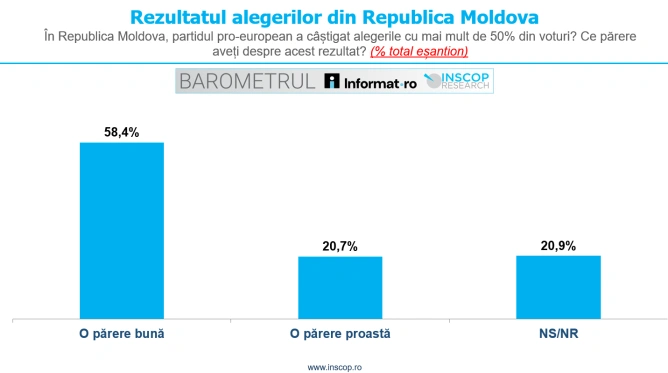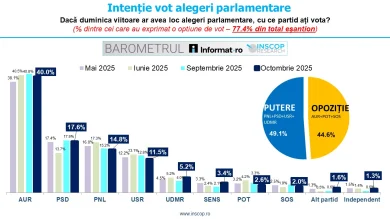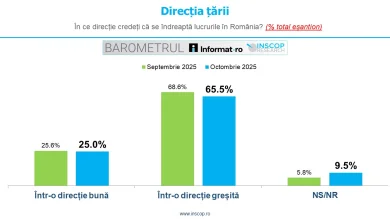
Chapter 2: The Results of the Elections in the Republic of Moldova
According to BAROMETER Informat.ro – INSCOP Research, edition IV, conducted between October 6-10, 2025, more than half of Romanians have a good opinion about the results of the elections in the Republic of Moldova, where the pro-European party won the election with more than 50% of the votes.
BAROMETER Informat.ro – INSCOP Research is a monthly opinion poll conducted by INSCOP Research on behalf of the news platform Informat.ro in partnership with the Strategic Thinking Group think tank.
BAROMETER Informat.ro – INSCOP Research aims to bring to public attention topics of interest to stimulate national conversations about various subjects and essential public policies for the present and future of Romania, based on the opinions of Romanians in partnership with prestigious think tanks and academic institutions. It is an initiative through which we aim to contribute to the strengthening of democracy by using scientific and credible tools that bring the voice of citizens to the forefront of public debate. Methodology: Data was collected between October 6-10, 2025. Research method: interview via questionnaire. Data was collected using the CATI method (telephone interviews), with a simple stratified sample volume of 1100 people, representative of significant socio-demographic categories (gender, age, occupation) for the non-institutionalized population of Romania, aged 18 and over. The maximum allowable error of the data is ± 2.95%, at a confidence level of 95%.
Graphical presentation of the data is available here: BAROMETER Informat.ro - INSCOP Research - The Results of the Elections in the Republic of Moldova
Remus Ștefureac – director INSCOP Research: "The perception of public opinion in Romania reflects a consistent support for the pro-European direction of the Republic of Moldova, which suggests cultural and political closeness, but also the trust of Romanians in the democratic evolution of the Republic of Moldova. On the other hand, the positive opinion is strongly correlated with the orientation of the parties. Voters of USR (92%), PNL (85%) and PSD (71%) strongly support the election results, while AUR voters are divided. Given that the leadership of AUR has intensely criticized the governing party in the Republic of Moldova, which won the elections decisively, it becomes relevant that half of AUR voters have an opinion contrary to AUR leaders, having a good opinion about the election results across the Prut. There is no category of the population in which the unfavorable opinion about the election results is stronger than the good opinion. However, the public with primary education, from rural areas or small towns is slightly more skeptical, but even among these categories, the proportion of good opinions about the outcome of the elections is significantly higher than the proportion of bad opinions.
The Elections in the Republic of Moldova
58.4% of respondents have a good opinion about the results of the elections in the Republic of Moldova, where the pro-European party won the elections with more than 50% of the votes. 20.7% have a bad opinion, and 20.9% do not know or do not respond.
71% of PSD voters have a good opinion about the victory of the pro-European party in the Republic of Moldova, while only 10% have a bad opinion. PNL voters: 85% have a good opinion, 12% have a bad opinion. USR voters: 92% have a good opinion, only 1% have a bad opinion. AUR voters: 39% have a good opinion, 39% have a bad opinion.
Men: 65% have a good opinion, 21% bad. Women: 52% have a good opinion, 20% bad.
18–29 years: 74% have a good opinion, 20% bad. 30–44 years: 51% have a good opinion, 23% bad. 45–59 years: 56% have a good opinion, 19% bad. 60+ years: 59% have a good opinion, 21% bad.
Primary education: 46% have a good opinion, 26% bad. Secondary education: 57% have a good opinion, 23% bad. Higher education: 79% have a good opinion, only 8% bad.
Bucharest: 73% have a good opinion, 11% bad. Large urban (over 90,000 inhabitants): 68% good, 12% bad. Small urban (under 90,000 inhabitants): 55% good, 19% bad. Rural: 52% good, 28% bad.
Public sector employees: 60% have a good opinion, 12% bad. Private sector employees: 62% have a good opinion, 20% bad.






